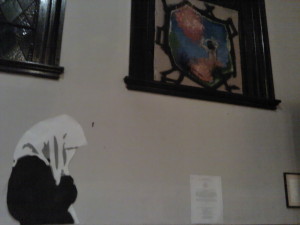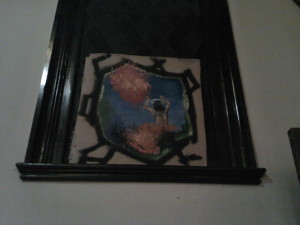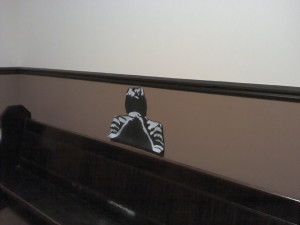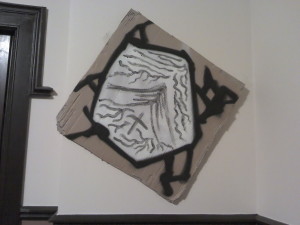We are human beings, and we come by imperfection honestly. We are born with it. A baby may not necessarily be born “stainedâ€, but it is born into systems of oppression and isolation. It is now a separate person from its mother and can never go back. Many of us spend our entire lives searching for that lost feeling of wholeness.
Our failings are a part of our humanity. We are all betrayed. We also all betray each other. At some point we un-learn trust and replace it with suspicion and fear. We betray our friends, our family, and our planet. Just as we are betrayed and we betray, we are condemned and we also condemn. We choose not to listen to someone who questions us because they make us uncomfortable, or maybe we don’t want to change. Plenty of voices who call us to be more are silenced in our time today. Likewise, sometimes we are silenced, or those closest to us may deny us at a time of need. Structures and institutions can also be sources of judgement. Sometimes we might feel like an insect underfoot, and sometimes we stand by watching helplessly while the machinery grinds someone else underfoot. Our culture contributes to this helplessness. Reality TV daily holds up lives that we are expected to laugh at and judge. This is only an extension of the culture that once gathered to watch public executions. Of course, if we see someone else being humiliated, we can easily tell ourselves that they deserve it. Nothing makes us feel better about our own shortcomings than comparing ourselves to others. This is only a reaction to our own feelings of inadequacy and loneliness.
 The Christian comfort in judgement is that Jesus fully understood our feelings because he experienced them. He was betrayed by Judas, condemned by his own religious leaders and the Roman State, denied by his best friend, and cruelly mocked by soldiers who put a fake crown and robe on him and spat in his face. Jesus accepted all of this as part of being human…and in a Christian worldview, that means that God accepted it and experienced it too. God, the source of all life, willingly gave up power in order to fully understand human frailty and brokenness.
The Christian comfort in judgement is that Jesus fully understood our feelings because he experienced them. He was betrayed by Judas, condemned by his own religious leaders and the Roman State, denied by his best friend, and cruelly mocked by soldiers who put a fake crown and robe on him and spat in his face. Jesus accepted all of this as part of being human…and in a Christian worldview, that means that God accepted it and experienced it too. God, the source of all life, willingly gave up power in order to fully understand human frailty and brokenness.
 Many of us are taught, throughout our whole lives, that we need to be strong and stand up for ourselves. The values of our society point to a “pull yourself up by your own bootstraps†thinking that sees the weak as disposable and prayer as useless. In a world like this, we may learn to appear like a rock on the outside, but inside, we may be falling apart.
Many of us are taught, throughout our whole lives, that we need to be strong and stand up for ourselves. The values of our society point to a “pull yourself up by your own bootstraps†thinking that sees the weak as disposable and prayer as useless. In a world like this, we may learn to appear like a rock on the outside, but inside, we may be falling apart.
Lent is about recognizing and embracing our fallen-ness, weakness, and mortality. We take responsibility for the places where we have failed – personally and as a species – to act with integrity, stand up for justice, and live with humility. Our hopelessness may be from different sources, but they are all tied to the same human sense of despair. Maybe we betrayed someone. Maybe someone was dying and there was nothing we could do to save them. Maybe we were slaves to addiction. Whatever was happening to us, we were in a place where we found ourselves alone in our Garden of Gethsemane at night, and our sweat became like great drops of blood. We were bowed down under the weight of our fear and asked God to take away the pain that rested on us, or the pain that we knew was to come…and knew in our hearts that it wouldn’t happen.
What we might not have known at the time was that the pain was the beginning of a longer journey that somehow, against all odds, ended on a misty, troubling, beautiful morning.
Hi, everyone!
As you all may or may not know, two years ago a friend and I put together a special art installation in a small urban parish for Lent and Holy Week. We called the project “Writing the Dark Nights of our Lives,” and, taking inspiration from graffiti artist Banksy, commissioned several artists inside and outside the parish to create six paintings and six accompanying figures for a stripped down version of the Stations of the Cross. The pieces were added over a period of several weeks, stuck right to the walls of the church as though they had been spray-painted there. All of this was accompanied by a blog and Twitter feed as well as accompanying sermons.
My main job was to co-ordinate, manage the blog, contribute to the Twitter feed, and help host “Writing the Dark Night Wednesdays,” where we opened up the church after Wednesday evening Eucharist and invited anyone who wished to come in, explore the art, and listen to music I provided. I also wrote six reflections for the stations, which were posted when each station was added, and then combined to create a liturgy where we actually walked these Stations of the Cross on Good Friday 2013.
The response from the parish was amazing, more than we ever could have asked or imagined. We had expected push-back, maybe even a little offense, but instead were met with deeply prayerful engagement.
My friend left that year shortly after the project finished to complete seminary training in Ontario. This year he has been emailing me to let me know that he has been sharing the liturgy with churches he has been working with. Apparently the response has been good – even former Primate Michael Peers called it “spectacular”!
Since we’ve had such a good response, I decided I would post the text I wrote with the Stations, along with photos of the paintings. There are six so we’ll have just enough time if I post one for each day of Holy Week.
Enjoy!
-Clarity
Passages cited can be found here and here.
“Are we there yet?â€
Who has suffered through the chorus of the song that doesn’t end? Tell your story, and make my mother proud.
I was never one of those kids. I managed to absorb the sound logic behind “We’ll get there when we get there†at a very early age. I’ve found that a lot of people seem to increasingly talk about patience as though it’s an inherent gift, and I really don’t think that’s true at all. Patience is a skill that must be built, tested, and nurtured. Like any skill, it gets better with practice, and since I am a child of a single working mom, I had plenty of chances to learn patience.
Likewise, trust. I had faith that when we did arrive at our destination my mother would tell me and give me time to get ready. I learned to wait for that voice.
Now there are times where waiting is something that takes very little effort. But there are times when waiting is almost impossible. Christmas morning. The baby’s arrival. The paycheque. The medical tests. The integration of loss, the sudden absence that drags all days into one day.
So while the complaint of the Israelites in today’s passage is pretty ridiculous – “We have no water and no food – and this food is gross!†– I can understand that years wandering through the wilderness would wear on a body, even a body kept alive through the power of magic rock water and angelic bread and heavenly quail. I can imagine that patience would be threadbare and faith would be running dry.
So the complaints rise up, and it seems like God has a little tantrum and throws snakes into the mix. One source I consulted for this sermon tries to let God off the hook: “The text doesn’t actually say that God sent the snakes because people were complaining!†Well, it’s not an unreasonable assumption. I can feel sorry for people who are stuck wandering the desert for generations, but I can really feel sorry for someone who has given and given and given and ends up taken for granted. Just before this passage in Numbers God helped the people win a huge military victory. Poisonous serpents might seem like overkill, but heck, they were already in the desert in abundance. And not to be a nitpicker, but serpents don’t generally bite people for no reason. Did God perhaps put serpents into people’s shoes? Maybe cut these wiggly little guys some slack.
So perhap it’s a bit silly to make excuses for God by suggesting that the snakes are not linked to the complaining of the people. But one thing to note is that at no point in the text is the word “punishment†explicitly named. The people tell Moses that they have sinned, but neither Moses nor God ever comes out and says the serpents are apunishment. So while it’s fair to say the serpents are linked to the people’s behaviour, perhaps what God was trying to communicate was more ambiguous and less human than, “You think you’ve got it bad now? Baby, you ain’t seen nothing yet.â€
Well, I read a fascinating midrash by an ancient Rabbi on this text that I thought rang true.
It had to be serpents…because it was a serpent in the Garden.
In Genesis, the first one to be punished is the serpent. What’s most important for today is the line “Upon your belly you shall go, and dust you shall eat all the days of your life.†Presumably the serpent did not slither before that day. A body was broken: the serpent was forever changed. A relationship was broken: between humankind and this species. In addition to this, the Hebrew word translated “poisonous†in English is actually more accurately translated “fiery†– and what was it that guarded the gate between Eden and the rest of the world once we were expelled? A fiery sword.
Echoes of Eden permeate this passage.
So as the people stumble around in the desert, remembering fondly their days of slavery and degradation, maybe God is reminding them, “Hey. Haven’t you learned anything? There was a real expulsion once.†And finally someone gets it, and they beg for help. And Moses creates this bizarre icon, called Nehushtan in the Book of Kings. It is bronze because the Hebrew word for bronze is like the Hebrew word for serpent – so it’s not just a serpent, it’s a serpent-y serpent. One English translation highlights this emphasis with the phrase “copper viper.†Perhaps, rather than focussing on a remnant of ancient folk medicine, we might understand this as an undoing of the serpent’s punishment – lifting up what had been condemned to crawl, and making a healer of what was once a source of enmity and fear, striking our heels while we struck its head. A broken body has been lifted up and made everlasting in bronze, and a broken relationship has been re-imagined, from enmity to healing.
You’ll notice that God does not take the serpents away. That’s never been God’s style. God’s honest like that, never choosing to erase the rough parts of a relationship. I think this is part of the everlasting truth of God’s drawing closer to us, having to learn to be awkward and broken, as we are, loving us for that earthy quality that after all comes straight from the divine hand and the divine breath.
But what does this have to do with “God so loved the world?â€
In the season of Lent, the sand of the wilderness gets into our nooks and crannies and slows us down. We feel the burning heat of the desert and focus on the sting of our separation from God. Our lives are full of wilderness space, and so is our world. We might forget to look at Nehushtan, the copper viper. Maybe Moses could make water burst forth from a rock, but how are we supposed to get water to nourish our patience and our faith in the desert? Where’s our magic staff? How can we possibly change things for the better when there is so much left barren and broken in our lives? How can we possibly come home to God when there is so much ignorance and fear and terror and apathy in the world that a thousand seasons of Lent could not be filled with penance enough to bring back Eden?
Once again, God makes foolishness out of our wisdom. God flips everything upside-down. God puts a crack in everything for the light to get in.
God becomes Nehushtan.
The Cross, symbol of humiliation, pain, mob “justice,†and the tyranny of Empire will become a symbol of triumph.
Like the serpent who deceived us being replaced by one who heals us, the tree that administered our expulsion is replaced by one that administers a new fruit, a fruit that gives us life, abundantly.
Creative, isn’t it? I hope you’d expect no less from your Creator.
So how should we respond?
We keep walking. The desert looks endless, and in a way it is, but there’s no fear in that. An earthly desert is actually packed full of secret life – how much more is the desert of a human life…or a heavenly desert?
God promises: There’s water in the rock. There’s healing in the serpent. There’s fruit on the tree. There’s a crack in everything – and the light is shining in.
God so loves the world: In the deepest wisdom of the created order, God chooses the foolishness of the world to make known the wisdom of the divine; chooses brokenness to bind up wholeness; chooses the profane to house the sacred. The truth of the world is transformation – the emptying out in order to be filled.
Jesus tells us it must be so, or there is no transformation.
It must be so, or we won’t get it.
And God wants us to get it. Reach out, and take it.
It’s yours.
It’s ours.
This is another excerpt from the Daily Office Challenge blog – a post on my life of daily prayer.
Starting was the easy part. I took it slow at first, mostly focussing on Morning Prayer, and keeping things short and simple. I would try to do Evening Prayer, but some days it just didn’t happen. I didn’t sweat it. I wanted to ease into it, like you would any new regimen for which you were untrained and unsure.
Eventually, it became a consistent habit. I was happy with it, and it made a big difference in my life. It moved from being interesting but a little tedious to just becoming a part of my day, like brushing and flossing. Conditions were never ideal: I had to do it in the living room with my husband only a few feet away at his computer. I had positioned an icon of the Mandylion and seasonally changing decorations over the TV, which helped, but I really wanted somewhere a bit more private. Still, this was what I got, and it wasn’t bad. At a certain point, having integrated some shamanic soul-clearing exercises that a friend had given me into the practice, I even had several mystical experiences. All of it came to a very postmodern Millennial head when I started doing “Twitter Compline,†celebrating my Evening Prayer in public on Twitter. I had several friends consistently join me for a few months before it came back to mostly just me. It didn’t matter. It was a part of my day.
All of it changed when my father died.
He died with absolutely no warning to the rest of us, although he had been told by his physician that he needed to start taking cholesterol medication and he had not followed that advice. On a Wednesday morning last April he had a massive heart attack and was killed almost instantly.
I kept celebrating Twitter Compline for a while, and eventually, I just stopped. I found that I didn’t have the energy to keep it up as I had. I wasn’t exactly angry at God, but it took everything I had to keep up with everything else going on in my life, which included graduating with my master’s and being sent to the annual event called ACPO to consult with others over whether I could be ordained a priest. It would have been an incredibly emotional time without all of the extra theatrics, so I lost hold of things.
In September I began an internship in a large pseudo-suburban parish, and I was of course strongly encouraged to take up the habit again. It was difficult at first. I have never been a morning person and had to get up fairly early to get to the parish on time. Getting up even earlier to celebrate Morning Prayer seemed impossible. Finally, though, I re-gained my hold, and interestingly enough I’m right back where I started: Morning Prayer six days a week (I don’t do it Sundays) and Evening Prayer when I remember.
I’m taking the Daily Office Challenge to regain the custom I had been managing before my 2014 exploded. It is not only to thank God for holding me up through this most dramatic period of my life, but also to rediscover a piece of myself that I lost touch with.
It is so easy in this busy world to lose sight of why we are doing the things we are doing. I hope and pray that all of those who are walking this path with me find or craft a piece of themselves that will help them remember that they are all part of God’s beautiful and blessed creation.
Here is an excerpt from another blog I’m running for my internship.
Daily prayer is a natural response to the idea that “heaven and earth are full of God’s glory.â€
This is part of what led the Celtic people to mark the most boring everyday tasks with prayer. In a collection of prayers called the Carmina Gadelica, you can find prayers for everything from washing your face to milking the cows to starting on a journey.
One particular Celtic ritual that speaks beautifully to daily prayer (and for which there are many prayers) is smooring the hearth.
Peat is a turf substance that is plentiful in Ireland and other countries on the continent. It occurs in bogs when conditions are too acidic for plant material to break down properly. It has had a multitude of uses over the years and works especially well as fuel for indoor fires.
To “smoor†something means “to smother†it. It’s dangerous to leave any kind of fire unattended, but cottages in Ireland, a very wet and damp place during many parts of the year, would get very cold at night while people were asleep. At some point in ancient history, someone discovered that a peat fire could be smothered enough that it would keep burning throughout the night.
When I learned about this, I thought it was a beautiful way to describe the spiritual life. Our earth has four seasons, but a human life also has seasons. A healthy life of prayer will not be one continuous spike upward, nor should it always be going downward. There will be both of those things, but in between there will be long stretches and plateaus. I feel the practice of daily prayer is a way of smooring the heart(h), keeping the light of God burning during the flat periods of one’s life.
“The Sacred Three to save, to shield, to surround
the hearth, the house, the household
this eve, this night.
Oh, this eve, this night
and every night,
every single night. Amen.â€
– Prayer for smooring the fire, Carmina Gadelica

 The Christian comfort in judgement is that Jesus fully understood our feelings because he experienced them. He was betrayed by Judas, condemned by his own religious leaders and the Roman State, denied by his best friend, and cruelly mocked by soldiers who put a fake crown and robe on him and spat in his face. Jesus accepted all of this as part of being human…and in a Christian worldview, that means that God accepted it and experienced it too. God, the source of all life, willingly gave up power in order to fully understand human frailty and brokenness.
The Christian comfort in judgement is that Jesus fully understood our feelings because he experienced them. He was betrayed by Judas, condemned by his own religious leaders and the Roman State, denied by his best friend, and cruelly mocked by soldiers who put a fake crown and robe on him and spat in his face. Jesus accepted all of this as part of being human…and in a Christian worldview, that means that God accepted it and experienced it too. God, the source of all life, willingly gave up power in order to fully understand human frailty and brokenness.
